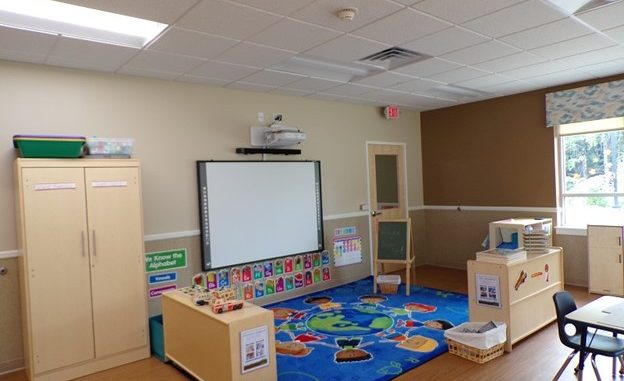
HOLLY SPRINGS — The first Lightbridge Academy in North Carolina opened its doors this week in southern Wake County.
Becky Grovenstein is the franchise owner. As a mom and former music teacher, she said she valued how important childcare can be to the peace of mind of parents, and even more so during school closures due to the coronavirus pandemic.
“If you were to ask Guy Falzarano, our CEO, what line of business are you in, he’s going to look at you and he’s going to say we’re in the trust business,” Grovenstein said.
“It takes a long time to fill that bucket,” Grovenstein said of building trust with families, adding that once that bucket is knocked over, it takes “a long time to fill it back up again.”
Guy and Julie Falzarano founded Rainbow Academy in 1997 in New Jersey.
The organization changed its name to Lightbridge Academy in 2014. In 2019, Lightbridge Academy was ranked on Entrepreneur Magazine’s Franchise 500.
According to the company’s website, Lightbridge Academy “was built on a foundation of family values,” and is “a place where parents, children, staff members, as well as the community and franchise owners come together as a family to create a trusted Circle of Care.”
Lightbridge has 100 childcare centers either open or that are in various stages of development in Florida, Maryland, New Jersey, New York, Ohio, Pennsylvania, and Virginia.
North Carolina is the latest state to add a Lightbridge center, located in the suburban town of Holly Springs. Grovenstein said they broke ground on Oct. 8, 2019. A second location is scheduled to open in Apex.
The facility at Holly Springs is state of the art, offering spacious suites for infants and learning and play spaces school-aged children up to the age of 12. The facility provides a safe environment with a robust heating, ventilation, and air conditioning (HVAC) system which Grovenstein says includes an air filtration system.
“It sanitizes the air and also sanitizes the surfaces,” Groventstein said. She also noted that their staff and enrollees follow the state’s COVID-19 guidance on masks, social distancing, sanitation and cleaning.
In terms of additional safety, the entry to Lightbridge has facial recognition with built-in temperature reading capabilities.
The Holly Springs location opens at a time when around 1 million of North Carolina’s K-12 students have been forced to start the year under remote instruction.
“We are here to help and support the virtual learning piece,” said Grovenstein.
Parents have been aggressively seeking supplemental instruction and support for their children and many seem to have found it at Lightbridge. Grovenstein said that their supplemental school-aged program is already full and that they do have a waitlist. She said the goal for that program is usually 25 enrollments and right now they have 105.
“So, if you are in the virtual academy, instead of you sitting in an office or a kitchen counter or at mom and dad’s work while you are doing your school work, we are going to have you in a classroom where you have your own little learning cabana.”
There will be teachers there to help facilitate using the apps and platforms required for some lessons, Grovenstein told North State Journal during a walkthrough of the facility. Teachers will help students working through issues with assignments and lessons to try and help keep them from falling behind.
The facility has options for supplemental care for students who signed under Plan B, which is a rotation of one week of in-person instruction and two weeks of remote instruction.
“One of the things at Lightbridge that we strive for is that we are the solution for working parents,” said Grovenstein of Lightbridge’s supplemental school-aged program.
Remote learning has led to a high degree of isolation for North Carolina students and the lack of socialization has been especially hard on school-aged children. Grovenstein said that a big piece of the support for those enrollees who are virtual academy learners will be socialization. She says that the window of time in between classes is a good opportunity for students to spend time socializing with other students.
Last week, Gov. Roy Cooper announced that elementary level students could be allowed back to school under Plan A, which is five-day-a-week instruction at school.
The Wake County School Board has not yet decided how or if they are able to move to Plan A. The board and district officials indicate that Oct. 26 would be the earliest students who opted for Plan B would return for in-person instruction and a detailed plan for moving forward isn’t expected until next month.
The district saw heavy enrollment in its “Virtual Academy” offering, which locks students, and a large number of teachers, into remote instruction for the first two quarters of the 2020-21 school year. In July, 78,792 applications for the Wake County Virtual Academy were received, which is almost half of the district’s 162,000 students.
Grovenstein said they’ve discussed how to successfully support Virtual Academy students and that the key is communication “between the teacher at Lightbridge, the parents and then the teacher at Virtual Academy, so that all three can team up to help with the best interests of the child who is still having to learn through a computer.”



